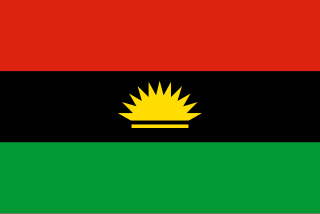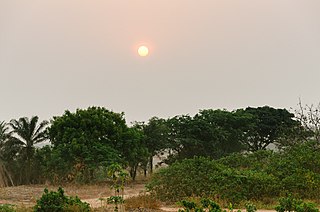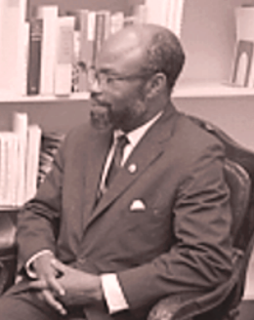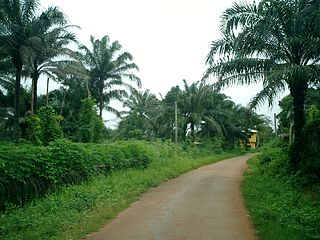
The history of Nigeria can be traced to settlers trading across the middle East and Africa as early as 1100 BC. Numerous ancient African civilizations settled in the region that is known today as Nigeria, such as the Kingdom of Nri, the Benin Empire, and the Oyo Empire. Islam reached Nigeria through the Bornu Empire between and Hausa States around during the 11th century, while Christianity came to Nigeria in the 15th century through Augustinian and Capuchin monks from Portugal. The Songhai Empire also occupied part of the region. From the 15th century, European slave traders arrived in the region to purchase enslaved Africans as part of the Atlantic slave trade, which started in the region of modern-day Nigeria; the first Nigerian port used by European slave traders was Badagry, a coastal harbour. Local merchants provided them with slaves, escalating conflicts among the ethnic groups in the region and disrupting older trade patterns through the Trans-Saharan route.

Biafra, officially the Republic of Biafra, was a partially recognised secessionist state in West Africa that declared independence from Nigeria and existed from 1967 until 1970. Its territory consisted of the predominantly Igbo-populated Eastern Region of Nigeria. Biafra was established on 30 May 1967 by Igbo military officer C. Odumegwu Ojukwu under his leadership, following a series of ethnic tensions and military coups after Nigerian independence in 1960 that culminated in the 1966 massacres of Igbo people and other southeastern ethnic groups living in northern Nigeria. The military of Nigeria proceeded to invade Biafra shortly after its secession, resulting in the start of the Nigerian Civil War.

Igbo is the principal native language of the Igbo people, an ethnic group from Southeastern Nigeria.

Ọdinani, also Omenala, Omenana, Odinana or Ọmenani, are the traditional cultural beliefs and practices of the Igbo people of south east Nigeria. These terms, as used here in the Igbo language, are synonymous with the traditional Igbo "religious system" which was not considered separate from the social norms of ancient or traditional Igbo societies. Theocratic in nature, spirituality played a huge role in their everyday lives. Although it has largely been supplanted by Christianity, the indigenous belief system remains in strong effect among the rural and village populations of the Igbo, where it has at times influenced the colonial religions. Odinani is a pantheistic and polytheistic faith, having a strong central deity at its head. All things spring from this deity. Although a pantheon of other gods and spirits, these being Ala, Amadiọha, Anyanwụ, Ekwensu, Ikenga, exists in the belief system, as it does in many other Traditional African religions, the lesser deities prevalent in Odinani expressly serve as helpers or elements of Chukwu, the central deity.

The Igbo people are an ethnic group in Nigeria. They are primarily found in Abia, Anambra, Ebonyi, Enugu, and Imo States. A sizable Igbo population is also found in Delta and Rivers States. Large ethnic Igbo populations are found in Cameroon, Gabon, and Equatorial Guinea, as well as outside Africa. There has been much speculation about the origins of the Igbo people, which are largely unknown. Geographically, the Igbo homeland is divided into two unequal sections by the Niger River—an eastern and a western section. The Igbo people are one of the largest ethnic groups in Africa.

The Nigerian Civil War was a civil war fought between Nigeria and the Republic of Biafra, a secessionist state which had declared its independence from Nigeria in 1967. Nigeria was led by General Yakubu Gowon, while Biafra was led by Lt. Colonel Chukwuemeka 'Emeka' Odumegwu Ojukwu. Biafra represented the nationalist aspirations of the Igbo ethnic group, whose leadership felt they could no longer coexist with the federal government dominated by the interests of the Muslim Hausa-Fulanis of Northern Nigeria. The conflict resulted from political, economic, ethnic, cultural and religious tensions which preceded Britain's formal decolonization of Nigeria from 1960 to 1963. Immediate causes of the war in 1966 included ethno-religious violence and anti-Igbo pogroms in Northern Nigeria, a military coup, a counter-coup and persecution of Igbo living in Northern Nigeria. Control over the lucrative oil production in the Niger Delta also played a vital strategic role.
Anarchism in Nigeria has its roots in the organization of various stateless societies that inhabited pre-colonial Nigeria, particularly among the Igbo people. After the British colonization of Nigeria, revolutionary syndicalism became a key factor in the anti-colonial resistance, although the trade union movement deradicalized and took a more reformist approach following the country's independence. The contemporary Nigerian anarchist movement finally emerged from the left-wing opposition to the military dictatorship in the late 1980s and saw the creation of the Awareness League.

The Women's War, or Aba Women's Protest, was a period of unrest in colonial Nigeria over November 1929. The protests broke out when thousands of Igbo women from the Bende District, Umuahia and other places in eastern Nigeria traveled to the town of Oloko to protest against the Warrant Chiefs, whom they accused of restricting the role of women in the government. The protest encompassed women from six ethnic groups.

Igboland, also known as Southeastern Nigeria, is the indigenous homeland of the Igbo people. It is a cultural and common linguistic region in southern Nigeria. Geographically, it is divided by the lower Niger River into two sections: an eastern and a western one. Its population is characterised by the diverse Igbo culture and the speakers of equally diverse Igbo languages.

Eni Njoku was a Nigerian botanist and educator. He was vice-chancellor of the University of Lagos (1962–1965) and the University of Nigeria, Nsukka (1966–1970). He served in the Nigerian House of Representatives as federal minister of Mines and Power, and was chairman of the Electricity Corporation of Nigeria. He was an emissary at OAU-sponsored peace talks.

The Kingdom of Nri was a medieval polity located in what is now Nigeria. The kingdom existed as a sphere of religious and political influence over a third of Igboland, and was administered by a priest-king called an Eze Nri. The Eze Nri managed trade and diplomacy on behalf of the Nri people, a subgroup of the Igbo-speaking people, and possessed divine authority in religious matters.

Ikenga is a horned Alusi found among the Igbo people in southeastern Nigeria. It is one of the most powerful symbols of the Igbo people and the most common cultural artifact. Ikenga is mostly maintained, kept or owned by men and occasionally by women of high reputation and integrity in the society. It comprises someone's Chi, his Ndichie (ancestors), aka Ikenga, ike (power) as well as spiritual activation through prayer and sacrifice.

Ohafia is an Igbo town in the Ohafia local government area (LGA) in Abia State, Nigeria. It is an Igbo speaking region. The ancestral capital of Ohafia town is the centrally located village of Elu. Ohafia Local Government Area, is an administrative jurisdiction assigned by the Nigeria Government, which covers the entire Ohafia villages and other clans such as Abiriba and Nkporo, with its Administrative Headquarters at Ebem Ohafia.
Ngwa people, an Igboid tribe in south eastern part of Nigeria. It's also the largest and most populous ethnic group in Abia state southeastern Nigeria. They occupy an area of about 1,328 square kilometres (513 sq mi), although some accounts read at least 2,300 km2. In 1979, their population was held at an estimate of approximately 1.8 million people, the current population is estimated to be 4 million+ Within the seventeen local government areas of Abia State, Nigeria. Ngwa people occupy nine Local Government Areas which include: Aba North, Aba South, Isiala Ngwa North, Isiala Ngwa South, Obi Ngwa, Osisioma, Ugwunagbo, Ukwa East, Ukwa West.

Awka-Etiti, historically known as Awka-Diedo ; later mentioned as Awka-Nkakwu (Okankaku) by colonial authors, is an affluent town comprising seven villages in Idemili South local government area of Anambra state, Nigeria. The seven villages of Awka-Etiti in order of age established are: Nkolofia, Umunocha, Ejighinandu, Iruowelle, Umudunu, Nnaba and Ogunzele.
Nwando Achebe is a Nigerian-American academic, academic administrator, feminist scholar, and multi-award-winning historian. She is the Jack and Margaret Sweet Endowed Professor of History and the Associate Dean for Diversity, Equity, and Inclusion in the College of Social Science at Michigan State University. She is also founding editor-in-chief of the Journal of West African History.
Maxine Kamari Clarke is a Canadian-American scholar with family roots in Jamaica. As of 2020, she is a distinguished professor at the Centre for Criminology & Sociolegal Studies and the Centre for Diaspora & Transnational Studies at the University of Toronto. In 2021, she was named a Guggenheim Fellow.
World Igbo Congress (WIC) is a Houston-based sociopolitical organization that promotes the Igbo people's interests in Nigeria. It focuses its support on economic and legal aid to the Igbo population, the victims of ethnic cleansing before and after the Nigerian Civil War, as well as the rehabilitation of Biafran War veterans.

The 2023 Enugu State gubernatorial election will take place on 11 March 2023, to elect the Governor of Enugu State, concurrent with elections to the Enugu State House of Assembly as well as twenty-seven other gubernatorial elections and elections to all other state houses of assembly. The election will be held two weeks after the presidential election and National Assembly elections. Incumbent PDP Governor Ifeanyi Ugwuanyi is term-limited and cannot seek re-election to a third term.

![]() listen ) (Igbo: ikpirikpi ogu) is a popular war dance performed in several parts of Eastern Nigeria. [1] The dance which has its roots from Ohafia is performed by a group of muscular men in commemoration of their strength in fighting and winning wars in the past. [2]
listen ) (Igbo: ikpirikpi ogu) is a popular war dance performed in several parts of Eastern Nigeria. [1] The dance which has its roots from Ohafia is performed by a group of muscular men in commemoration of their strength in fighting and winning wars in the past. [2] 













